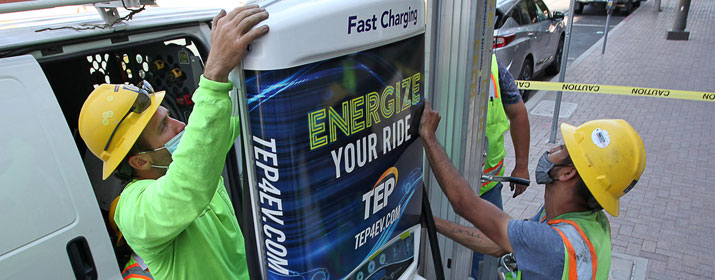
When the pandemic hit, Step Up to Justice immediately saw an increase in requests for legal assistance from low-income residents facing housing issues and eviction risk.
The nonprofit group quickly responded – and TEP was there to help.
For two years, TEP has provided a total of $30,000 in grants to Step Up to Justice, a local nonprofit organization that connects low-income residents with volunteer attorneys who provide free legal services. Primarily, TEP’s contribution has assisted with housing insecurity, reaching 947 people in the past year alone.
“One great thing about Step Up to Justice is it’s able to pivot quickly and address the evolving needs of its clientele,” said Ryan Anderson, TEP’s Manager of Business Development and a Step Up to Justice board member.
Step Up to Justice’s mission fits with TEP’s philanthropic focus of community assistance, as well as our company’s efforts to address racial and social equity in the community. A women-led organization, Step Up to Justice serves a diverse clientele, mostly women of color.
“They are good at listening to the needs of the traditionally marginalized —and once they hear the needs, they are good at addressing them,” Anderson said.
Anderson helped connect Step Up to Justice with TEP for support. When Anderson previously worked in private law practice, he volunteered his time as an attorney. Now that he works at TEP, Anderson stays involved as a board member, organizing and emceeing events. Before the pandemic, TEP hosted the group’s annual fundraisers at TEP’s Downtown Headquarters for three years.
According to Step Up to Justice, more than 200,000 people live in poverty in Pima County, with about 70 percent of them needing civil legal help each year.
Executive Director Michele Mirto said her organization was already trying to find ways to remotely connect to clients, especially homebound and rural residents, before the pandemic started. So, the group was ready when the pandemic forced a switch to almost entirely remote work, linking private attorneys with online legal advice sessions.
Step Up to Justice held online clinics for clients who were having trouble paying their rent, challenged in finding safe, livable housing or negotiating with landlords. Melissa Spiller-Shiner, Associate Director, said there was also a lot of confusion about changing eviction moratoriums and needs for rental assistance.
During 2021, the organization:
- Conducted 163 housing clinics.
- Scheduled 435 appointments for these clients.
- Arranged for 13 volunteer attorneys to donate 376 hours of work.
This year, TEP’s grant will extend services for end-of-life planning. While Step Up to Justice had previously assisted older clients with wills and advanced directives, primarily, the group has found that younger people, specifically single parents, are requesting legal help to prepare for the possible care of their children.
“I think it’s definitely pandemic driven. In the past, they might not have thought about not being able to care for their children or designating care for their children,” Mirto said. “That’s an issue that has bubbled up to the top for people and they are reaching out for assistance.”
TEP’s support allows Step Up to Justice staff members to focus on their services, screening clients for their needs and connecting clients and attorneys rather than raising funds.
“The needs became even more acute during a crisis, such as the present one spawned by the COVID-19 pandemic, when the assistance of a lawyer can mean the difference between housing and homelessness, safety or insecurity, and work or unemployment,” Mirto said. “With the meaningful support of Tucson Electric Power, Step Up to Justice is able to continue to make access to justice a reality for low-income Tucsonans.”
About 4 percent of the community’s need was being met and less than 20 percent of available volunteers were used before Step Up to Justice launched in 2017. Since, the organization has expanded resources and increased services by 25 percent in the community, giving thousands of more residents access to pro bono legal services.
This story is part of our ongoing series highlighting TEP’s philanthropic focus areas, including community assistance. TEP works with nonprofit partners to develop invitation-based donation requests for community assistance efforts. Funds come from corporate resources, not customers’ rates. Learn more about donations.






